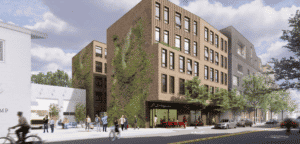Outraged at lawsuits challenging a pair of affordable housing projects in Jamaica Plain, Boston City Councilors Matt O’Malley and Kenzie Bok are seeking to remove off-street parking requirements for housing developments that include 100 percent affordable units.
Jamaica Plain commercial landlord Montgomery Gold is appealing the 38-unit affordable housing project by Jamaica Plain Neighborhood Development Corp. at 3377 Washington St. and recently settled a lawsuit that delayed groundbreaking of a 202-unit affordable housing project by the Pine Street Inn at 3368 Washington St.
“People think they can weaponize parking minimums as a way to extract concessions,” Bok said. “If it works, why not do it again? The only way to prevent that is to get rid of that hook for a lawsuit.”
Both of the Washington Street projects needed variances from the zoning board of appeals for minimum parking ratios, one of the points of contention in the lawsuits.
Gold leases the property next to 3371 Washington St. to Turtle Swamp Brewery for a production facility and taproom. The lawsuit, filed May 13 in Suffolk Superior Court, cites adverse effects of construction on the brewery and the lack of required on-site parking.
“Turtle Swamp Brewing noted that the lack of parking and loading areas would exacerbate the existing parking challenges in the neighborhood,” states the complaint filed by attorney Stephen Greenbaum on behalf of 3377 Washington LLC.
The councilors’ order also cites a project at 37 Wales St. in Dorchester, where the ZBA last month denied a variance for a 23-unit affordable housing project. Charlestown nonprofit Heading Home proposed 23 units for formerly homeless families earning a maximum 30 percent of the area median income. The project was approved by the BPDA board in January.
Parking requirements are particularly onerous burdens on affordable housing projects, which typically require multiple funding sources including public subsidies and tax credits, Bok said.
“Every parking space built or acquired for an entirely affordable housing development diminishes the funds available for additional affordable housing units,” the order states.
If approved by the city council, the order would go to the BPDA board for review.
Boston recently relaxed parking requirements for some multifamily developments under its popular compact living pilot, which grants relief from minimum parking ratios at properties located near public transit stops.
And in 2020, Cambridge city councilors enacted a zoning overlay that allows 100-percent affordable developments to be built anywhere in the city including single-family zones.




 |
| 




